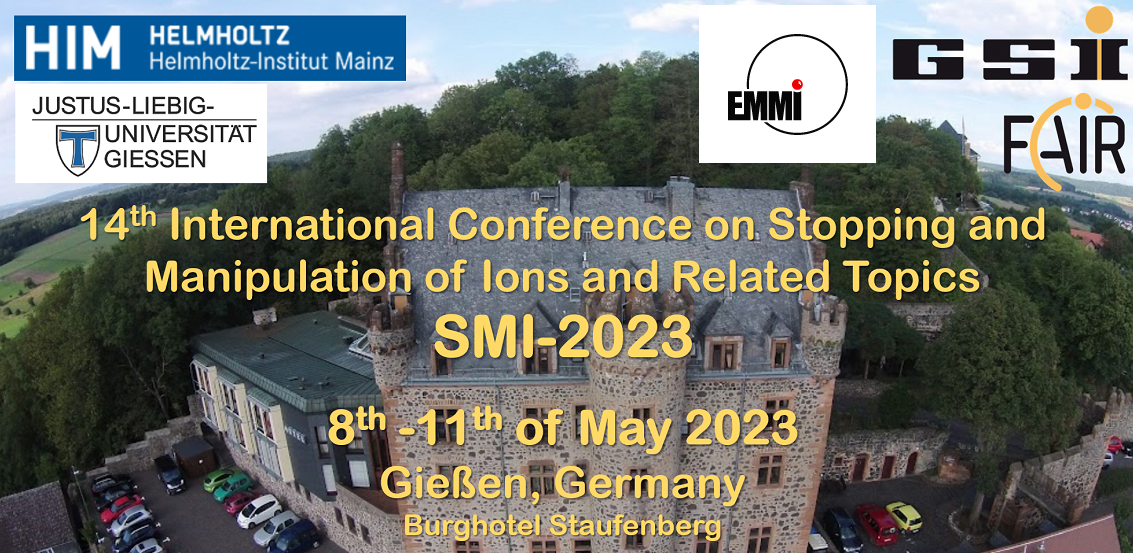Sprecher
Beschreibung
In-gas-jet laser spectroscopy of heavy actinides with JetRIS at GSI
Rafael Ferrer1, Julian Auler4, Michael Block2,3,4 Alexandre Brizard5, Premaditya Chhetri1, Arno Claessens1, Christoph E. Düllmann2,3,4, Francesca Giacoppo2, Manuel J. Gutiérrez2,3 Fritz-Peter Heßberger2, Fedor Ivandikov1, Tom Kieck2,3,4, EunKang Kim4, Sandro Kraemer1, Mustapha Laatiaoui4, Jeremy Lantis4, Nathalie Lecesne 5, Vladimir Manea6, D. Muenzberg2,3,4, Steven Nothhelfer2,3,4, Sebastian Raeder2,3, Emmanuel Rey-Herme7, Jekabs Romans1, Elisa Romero-Romero4, Elisabeth Rickert2,3,4, Antoine de Roubin1, Hervé Savajols5, Matou Stemmler8, Marine Vandebrouck7, Kenneth van Beek2,9, Piet Van Duppen1, Jessica Warbinek2,4, Klaus Wendt8, Alexander Yakushev2,3, Alexandra Zadvornaya1
1 KU Leuven, Instituut voor Kern- en Stralingsfysica, Leuven, Belgium
2 GSI Helmholtzzentrum für Schwerionenforschung, Darmstadt, DE
3 Helmholtz-Institut, Mainz, DE
4 Johannes Gutenberg-Universität, Department Chemie, Mainz, DE
5 GANIL, CEA/DRF-CNRS/IN2P3, B.P. 55027, 14076 Caen, France
6 Université Paris-Saclay, CNRS/IN2P3, IJCLab, 91405 Orsay, France
7 Irfu, CEA, Université Paris-Saclay, 91191 Gif-sur-Yvette, France
8 Johannes Gutenberg-Universität, Institut für Physik, Mainz, DE
9 Technische Universität, Institut für angewandte Physik, Darmstadt, DE
The In-Gas Laser Ionization and Spectroscopy (IGLIS) technique is a powerful tool to study atomic and nuclear properties of short-lived actinides. Such studies are important to understand the atomic level scheme of these heavy elements, which is influenced by strong electron correlations and relativistic effects. Also, fundamental nuclear properties such as moments, spins and charge radii are unknown for most of these nuclei. Thus, experimental data are crucial to test and improve the predictions of state-of-the-art atomic and nuclear theoretical models.
The Radiation Detection Resonance Ionization Spectroscopy (RADRIS) setup, at the GSI Helmholtzzentrum für Schwerionenforschung in Darmstadt, has recently provided such experimental data for nobelium and fermium isotopes [1, 2]. The RADRIS data, however, are limited in the attainable spectral resolution mainly owing to collision- and Doppler-broadening effects. To overcome these limitations the JetRIS setup [3] has been designed to perform laser spectroscopy in a low- density and low-temperature supersonic gas jet [4] produced by a convergent-divergent contoured nozzle installed at the gas cell exit [5,6]. The performance of JetRIS has been tested online with the spectroscopy of 254No, showing a six-fold increase in spectral resolution with respect to the RADRIS data.
In this contribution we will present the research and development work carried out to commission
the JetRIS setup as well as its performance in the last online campaign and the prospects.
[1] M. Laatiaoui et al., Nature 538, (2016) 495–498
[2 S. Raeder et al., Phys. Rev. Lett., 120 (2018) 232503
[3] S. Raeder et al., NIMB 463, (2020) 272–276
[4] Yu. Kudryavtsev et al., Nucl. Instrum. Methods Phys. Res. B, 297 (2013) 7-22
[5] R. Ferrer et al., Phys. Rev. Res., 3 (2021) 043041
[6] D. Muenzberg et al., Atoms 2022, 10(2), 57

